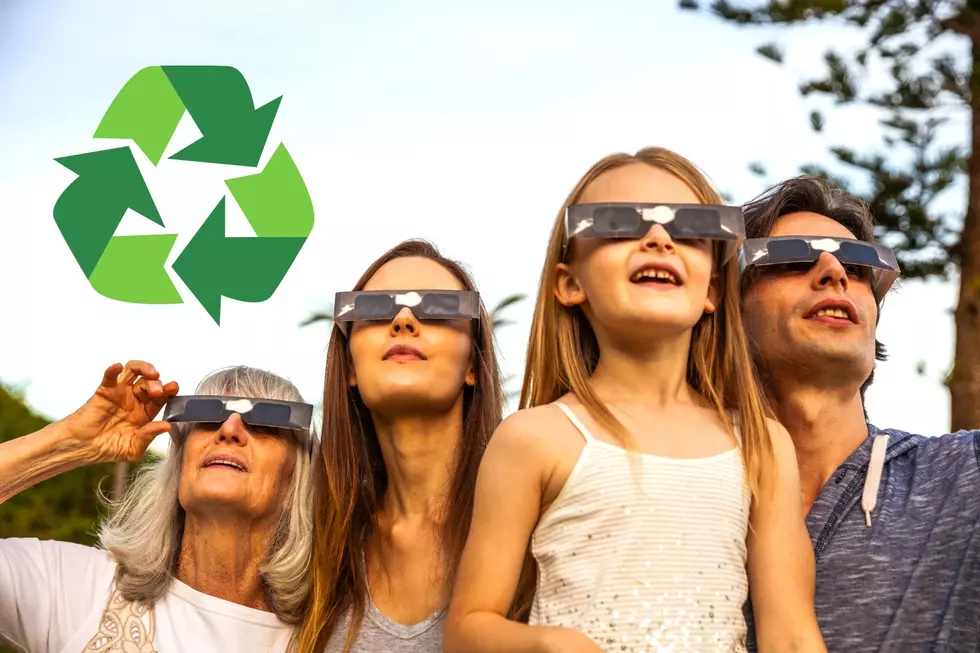
33 Places to Recycle Eclipse Glasses in Western New York
Don’t throw away those eclipse glasses; send them to young astronomers.
Mother Nature might not have provided Western New York with a picture-perfect day for Monday’s solar eclipse, but that doesn’t mean those eclipse glasses should go to waste.
Instead of tossing the special glasses in the trash, consider donating them to allow young astronomers in South America the opportunity to utilize them later this year.
An annular “ring of fire” eclipse will take place in South America, with the best viewing opportunities in Chile and Argentina, with the eclipse partially visible in Hawaii, on October 2, 2024, according to National Eclipse.
To help children in those countries enjoy the eclipse, in addition to helping others in the future, Astronomers Without Borders is teaming up with organizations across the country, including in Buffalo and Western New York, to collect gently used eclipse glasses to be recycled.
“Astronomers Without Borders has been sending solar glasses for annular and total solar eclipses since 2008,” the organization says. “From Africa, Asia, North and South America, our members, partners and National Coordinators helped to bring glasses to people who may not otherwise have a safe way to view the eclipse directly.”
34 Places to Recycle Eclipse Glasses in Western New York
There are plenty of places across Western New York to drop off your glasses if you’d like to help pay forward the incredible views we saw between the clouds on Monday, including:
● State University of New York at Buffalo: Glasses can be dropped off at 1Capen or the Sustainability Center, 20 Sprague Road by Crofts Hall on North Campus in Amherst or 1Diefendorf on South Campus, with glasses accepted through May 1.
● Most branches of the Buffalo & Erie County Public Library, including:
○ Alden Ewell Free Library
○ Angola Public Library
○ Aurora Town Public Library
○ Boston Free Library
○ Main Library at Audubon, Amherst
○ Central Library, downtown Buffalo
○ Clarence Public Library
○ Clearfield Branch Library, Amherst
○ Concord Public Library
○ Crane Branch, Buffalo
○ Dudley Branch, Buffalo
○ Eggertsville-Snyder Branch, Amherst
○ Elaine M. Panty Branch, Buffalo
○ East Clinton Branch, Buffalo
○ Eden Library
○ Elma Public Library
○ Frank E. Merriweather Jr. Branch
○ Hamburg Public Library
○ Kenilworth Branch, Town of Tonawanda
○ Kenmore Branch, Town of Tonawanda
○ Lackawanna Public Library
○ Lakeshore Public Library
○ Lancaster Public Library
○ Leroy R. Coles Jr Branch, Buffalo
○ Newstead Public Library
○ North Collins Public Library
○ North Park Branch, Buffalo
○ Orchard Park Public Library
○ Town of Collins Public Library
○ West Seneca Public Library
○ Williamsville Branch Library, Amherst
● Thin Ice Gift Shop, 719 Elmwood Avenue
If you’d like to keep the adventure going, Penn Dixie Fossil Park in Blasdell is offering a 50% discount on admission to the park during the first three weekends in May (4-5, 11-12, and 18-19). Admission with a donation of eclipse glasses during those weekends will be $8 for adults, $7.50 for seniors, military members and students, and $6.50 for children.
READ MORE: Rare Footage of New York City's 1925 Eclipse Discovered
But maybe you’ve caught the eclipse bug and are ready to travel the world chasing that feeling of celestial connectivity. If you want to plot your trip to catch the next total solar eclipse, put those glasses in a safe place while booking a trip to Russia, Greenland, Spain, Portugal, or Iceland for a total solar eclipse on August 12, 2026. If a partial eclipse will do, head toward Alaska, Connecticut, Delaware, Iowa, Illinois, Indiana, Massachusetts, Maryland, Maine, Michigan, Minnesota, Montana, North Carolina, North Dakota, New Hampshire, New Jersey, Ohio, Pennsylvania, Rhode Island, South Dakota, Virginia, Vermont, Wisconsin, and West Virginia and parts of central Canada.
Want to go somewhere a little more exotic? A total solar eclipse will pass through Australia and New Zealand on July 13, 2037, with totality expected to last nearly four minutes.
The next eclipse to grace the United States won’t happen until 2045, with totality happening over parts of California, Nevada, Utah, Colorado, New Mexico, Oklahoma, Texas, Arkansas, Missouri, Mississippi, Louisiana, Alabama, Florida and Georgia, along with the Bahamas, Turks and Caicos, Haiti, the Dominican Republic, Trinidad and Tobago, Venezuela, Guyana, Suriname, French Guiana and Brazil, with totality expected to last an incredible six minutes and six seconds.
Solar Eclipse Photos From Upstate New York
More From We are Buffalo









